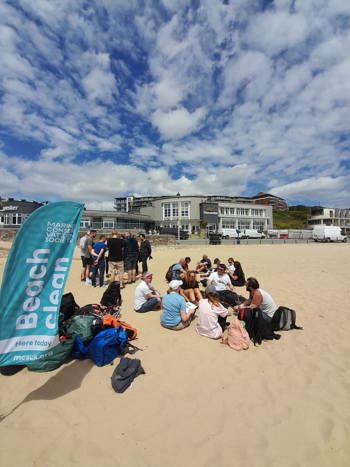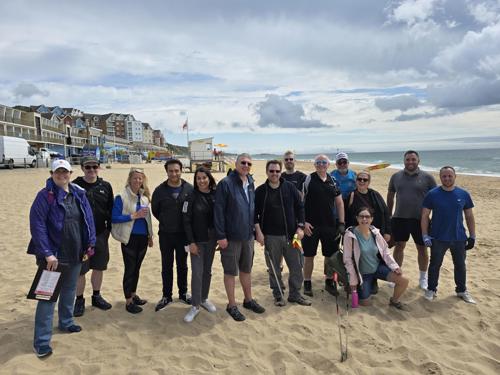
Partnering with the Marine Conservation Society, the UK’s leading marine charity, our teams participated in four impactful beach clean-ups across the country.
From the pebbled stretches of Worthing Beach in West Sussex to the scenic sands of Portobello Beach in Edinburgh, our volunteers dedicated their “Giving Back Days” to a cause that resonates deeply with our people: protecting the planet.
Other clean-up locations included West Kirby Beach in Liverpool and Boscombe Beach in Bournemouth - a total of 5500 pieces of litter were collected and removed across all sites.
A Partnership with Purpose
This initiative is part of a broader, long-term partnership between Access and the Marine Conservation Society, born from an internal employee survey that revealed a strong desire to support environmental causes. In response, The Access Foundation approved a generous £84,990 grant to fund marine conservation projects and educational outreach.

Founded in 1977 by a group of scientists, divers, and environmentalists, the Marine Conservation Society has been at the forefront of ocean advocacy for nearly five decades. Their mission is simple yet powerful: to create a sea full of life, where nature flourishes and people thrive. They work with communities, businesses, and governments to drive change through education, policy, and grassroots action.
Nick Leonard, Senior Consultant at The Access Group, working on PeopleXD shared his experience:
"The beach clean at Boscombe was my first charity day with the team, and I’m already looking forward to many more. While my main motivation was to give something back to nature, the experience was also incredibly educational—and a great opportunity to meet colleagues for the first time.
We began the day with an introduction to the Marine Conservation Society, which gave us valuable insight into the importance of our efforts—both locally and on a much broader scale. At first glance, the beach looked clean, but once we started really looking, we discovered a surprising amount of litter—some of which, we learned, could remain for decades or even centuries.
Plastic was by far the most common pollutant, showing up in everything from cigarette butts and nappies to broken toys. I’ve always loved our beaches, and this experience has inspired me to do even more to protect them—no matter how big or small the action."

Thalia Galloway, Product Owner at The Access Group added:
The beach clean opportunity in Bournemouth was perfect for me to join as I live locally. I have never taken part in a beach clean before, but was aware of the citizen science project run by the Marine Conservation Society (MCS): identifying what items are on our beaches to help change policy. The itinerary received before the day showed we had time scheduled for team building, so I was pretty excited. As someone who works from home, I was really looking forward to connecting with colleagues in person whilst making a difference to the environment.
The day did not disappoint! The clouds quickly cleared away as almost 30 of us collected together on the beach to meet Lizzie, the representative from the MCS. Lizzie briefed us on the purpose of MCS and our plan for the day before we split into small groups to complete the 100m litter pick and analysis. Each item we collected was matched up on the clipboards and tallied. In all we collected 1746 different litter items, including a stinky 612 cigarette stubs. The plastic in the filter papers mean these will not disappear for hundreds of years.
I really enjoyed the full day getting to know so many different colleagues from nearby and further afield. I fully recommend this experience to others.”
More Than Just a Clean-Up
The impact of these beach cleans goes far beyond the visible litter. Over half of the waste collected consisted of plastics, polystyrene, metal, and machined wood—materials that pose serious threats to marine life and ecosystems.
The data gathered during these clean-ups feeds into the Marine Conservation Society’s annual Beachwatch Report, a vital research initiative powered by over 15,000 volunteers and 1,200 litter surveys. This report plays a crucial role in identifying pollution sources and influencing environmental policy at the national level.
Giving Back, One Day at a Time
At Access, every employee is encouraged to take a day each year to support a charitable or environmental cause of their choice. These “Giving Back Days” are a cornerstone of our culture, empowering individuals to make a difference in the communities and causes they care about most.
Caroline Fanning, Chief Employee Success Officer added:
“Our partnership with the Marine Conservation Society demonstrates how our ESG commitments translate into meaningful, real-world impact.
Through Giving Back Days, this project has encouraged people to take tangible action—supporting cleaner, healthier oceans while directly contributing to the UN Sustainable Development Goals, especially Goal 14: Life Below Water and Goal 13: Climate Action.
Together, we’re not just cleaning beaches—we’re helping to build a cleaner, healthier future for our oceans and the generations to come.”


 AU & NZ
AU & NZ
 SG
SG
 MY
MY
 US
US
 IE
IE